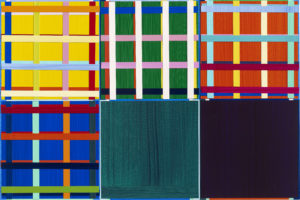Knoebel, Imi

Imi Knoebel was born in Dessau, Germany in 1940 and is one of the most important contemporary German artists. Revered for his minimalist and reductionist influences, Knoebel explores the interplay of colours as structured forms.
From 1962 to 1964, he studied applied arts at the Darmstadt School of Arts and Crafts. Knoebel’s studies followed the theories put forth by Johannes Itten and Lászlo Moholy-Nagy of the Bauhaus in Weimar and Dessau. In 1964-71 he studied at the Staatliche Kunstakademie in Düsseldorf, with Joseph Beuys as a teacher and with Blinky Palermo, Jörg Immendorff and Imi Giese as students, among others.
Knoebel also was interested in the principles seen in Kazimir Malevich’s oeuvre, which investigate the relationship between space, picture support and colour.
Knoebel initially focused on light projections, and pure white paintings. By 1974 he softened his reductionist position through the addition of colour. Knoebel’s artworks depict an explosion of different tints that are uniquely disciplined and presented in a manner that is highly geometric.
Knoebel's works are held worldwide in numerous public collections, including Dia:Beacon in Beacon (New York), The Museum of Modern Art in New York City, and the Albertina in Vienna, among others. Also the Deutsche Bank Collection has acquired more than 1,000 works on paper by Knoebel.
In 2011, he created several stained glass windows for the Reims Cathedral.

